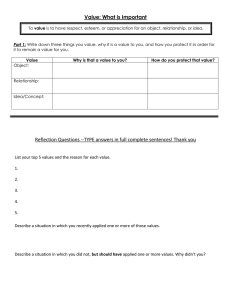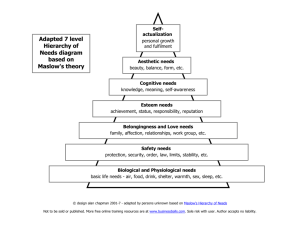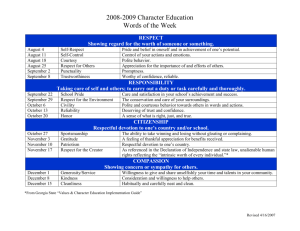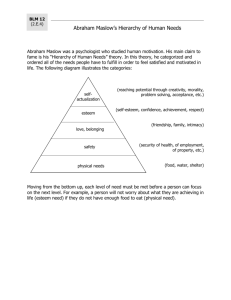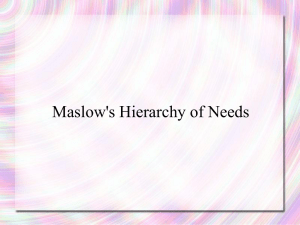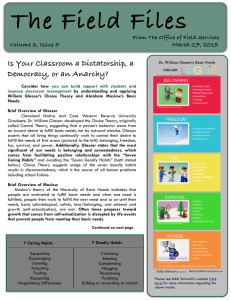HUMAN NEEDS Notes
advertisement
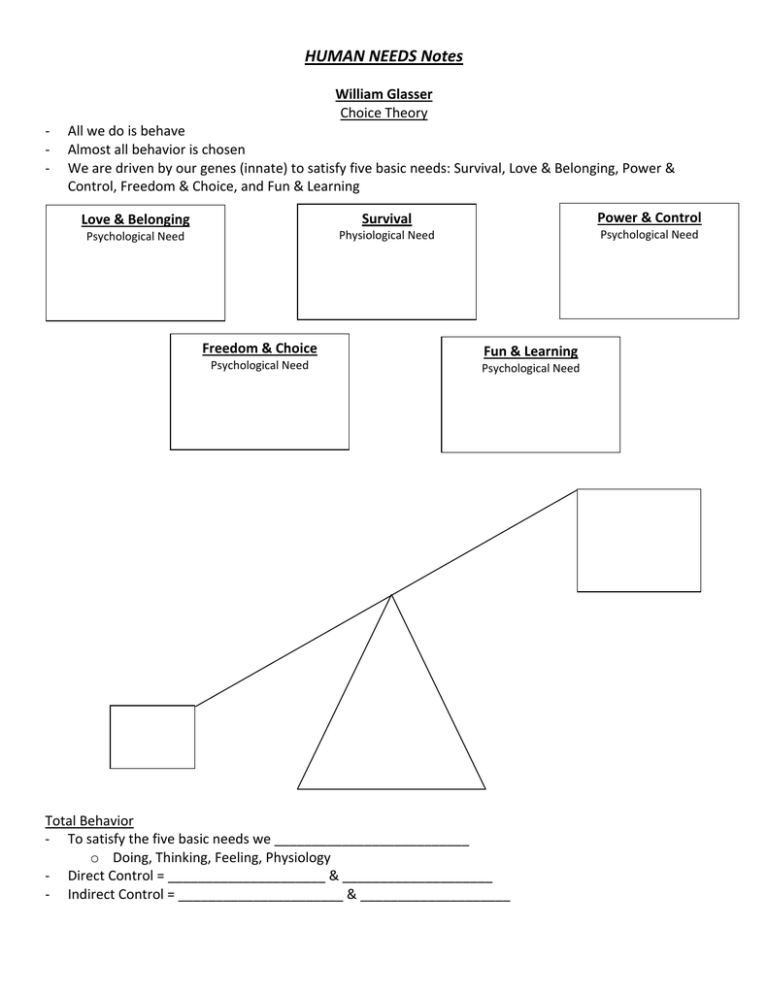
HUMAN NEEDS Notes William Glasser Choice Theory ‐ ‐ ‐ All we do is behave Almost all behavior is chosen We are driven by our genes (innate) to satisfy five basic needs: Survival, Love & Belonging, Power & Control, Freedom & Choice, and Fun & Learning Love & Belonging Survival Power & Control Psychological Need Physiological Need Psychological Need Freedom & Choice Psychological Need Fun & Learning Psychological Need Total Behavior ‐ To satisfy the five basic needs we __________________________ o Doing, Thinking, Feeling, Physiology ‐ Direct Control = _____________________ & ____________________ ‐ Indirect Control = ______________________ & ____________________ Abraham Maslow Hierarchy of Needs ‐ ‐ ‐ Each need must be “satisfied” in turn (starting on the bottom and working up to the top) o If our lower needs are not met/are swept away, we are no longer working on our higher needs… Lower needs are physical and emotional (D‐Needs) Upper needs are personal development (B‐Needs) Helping others to self‐actualize☺ Personal Growth, self‐fulfillment, etc. Beauty, balance, form, etc. Knowledge, meaning, self‐awareness, etc. Achievement, status, responsibility, reputation, etc. Family, affection, relationships, work group, etc. Protection, security, order, law, limits, stability, etc. Basic Needs – air, food, drink, shelter, warmth, sleep, etc. Deficit = D‐Needs ‐ ‐ ‐ ‐ ‐ ________ = you don’t have enough You can have “enough” If you don’t have “enough”, you feel the need to have it Your behavior is trying to fulfill that need If you get all that you “need” you will stop feeling the need to have it = move on to the next level Versus Being = B‐Needs/B‐Values ‐ ‐ ‐ ‐ You can never have “enough” Personal “growth motivation” Search for excellence and high principles (VALUES) VERY FEW people get to the top of the hierarchy…not because they are bad people, but because the D‐ Needs are not met (A SMALL) VALUE LIST Self‐Respect: Pride and belief in one’s self and in achievement of one’s potential. Self‐Control: Control of your actions and emotions. Authority: Respect for those individuals who are in positions of responsibility. Manners & Politeness: Using proper etiquette in relation to others. Learning/Wisdom‐Seeker: Appreciation for the importance of and effort involved in acquiring knowledge. Humility: Recognizing that any given person is one’s intellectual superior in some way can be learned from. Teachable/Not Arrogant: Recognizing the part that others have played in one’s achievement. Punctuality: Being on time. Trustworthiness: Reliable. Respect for others: Concern for and motivation to act for the welfare of others. Respect for the environment: The conservation and care for your surroundings. Accountability: Being responsible for your decisions and actions. Cheerfulness/Joyful/Optimistic: Good humored, bright and pleasant. Honor: A sense of what is right, just and true. Democracy: Respect for the rule of majority. Sportsmanship: The ability to take a winning and losing without gloating or complaining. Patriotism: Respectful devotion to one’s country. Gratitude/Thankfulness/Appreciation: A feeling of thankful appreciation for benefits received. Kindness: Being gentle, willing to help, friendly and considerate. Empathy/Compassion: Understanding, sensing and sharing in feelings and emotions of others. Self‐Confidence: Positive attitude about, and trust in one’s self; sense of security and self‐assurance. Creative/Flexible: Clever, imaginative and inventive; adaptability and versatility. Diligence: Consistent attention to quality work, remaining focused on your goal. Initiative: Proactive; thinking and taking action on your own. Resilience: The ability to bounce back from failure or discouragements. Self‐Reliance: Relying on one’s own abilities, efforts or judgments. Acceptance/Tolerance: Recognition of the diversity of others, their opinions, practices and cultures. Forgiveness: Benefiting yourself and others by ceasing to feel resentment toward others. Cooperation/Teamwork: Working together for a common purpose. Fairness: Equal treatment of behavior and viewpoints of others. Peacemaker/Non‐Violent: Seeks peaceful solutions to fights and quarrels. Motivation: The desire to move toward a goal. Determination/Dedication: Consistent attention to quality work; the inner strength to pursue a goal. Honesty: Truthfulness and sincerity. Dependability: To be counted on and trusted. Loyalty: Faithful to a person, organization or your country. Courage: To meet a challenge without giving in to fear. Patience: The power to wait calmly without complaining. Privacy: Respect for personal privacy and confidentiality. Fidelity: Keep your promises and agreements; be trustworthy. Integrity: Make your actions reflect your moral commitments, principles, beliefs and virtues. Justice: Treat people fairly, give people their due. Autonomy: Allow moral agents to make their own decisions and act on them. This principle implies freedom of thought, expression, and action. Beneficence: Help/benefit other people. Name _________________________ Hour___________ Values/Human Needs Article Find and read an article of your choice in which a VALUE is displayed. You can use any CREDIBLE news source (i.e. MSNBC, Star Tribune, Pioneer Press, CNN, New York Times, BBC, etc.), if you are unsure if your source is credible, ask! The article must be a minimum of 500 words! Once you find an article, copy and paste the entire thing into a word document (which is where you can check for the number of words ‐ ‐ tools then word count). Please use a minimum number of pages (i.e. change margins to .5” and/or change the font size). Thank you☺ *Staple your article to this worksheet!* 1. What website did use to find your article? _______________________________________________ 2. What value(s) did the person use in this article? 3. Explain how that/those value(s) was/were displayed. 4. Why do you think the main person in your article behaved the way he/she did? Explain yourself! 5. Thinking about Glasser’s Choice Theory, why did the person “choose” that behavior? Explain. 6. Do you agree or disagree with this theory explaining the persons’ behavior? Explain. 7. Thinking about Maslow’s Hierarchy of Needs, what need is trying to be “satisfied”? Explain. 8. Do you agree or disagree with this theory explaining the person’s behavior? Explain.
